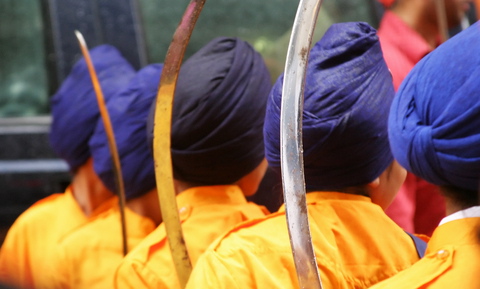
Paris, Jan 6 (IANS) — As all their attempts to resolve the issue with the French and European authorities have failed, the Sikhs are now turning to not only the Indian government but also the entire Indian diaspora to help them resolve a problem that threatens their religious identity.
“We want the Minister of Overseas Indian Affairs Vayalar Ravi to give a new boost to this case. We believe that it is possible to change the status quo only if the Indian government makes a robust intervention on our behalf with the French government and explain to them that a turban is an integral part of the Sikh identity,” Chain Singh, president of the Gurdwara of Bobigny, Paris, the biggest of the four gurdwaras in the French capital, told IANS.
The Sikh delegation is coming armed with a memorandum to be presented to Ravi and other ministers expected to be present at the PBD Jan 7-9 at the Vigyan Bhavan. The memorandum is signed by representatives of the four gurdwaras of Paris and nearly 4,000 Sikhs living in France.
“We need a commitment in writing from the French government, in which they will ensure that Sikh children succeeding within the French education system will be free to work in any government job with their turban,” says the memorandum.
The Sikhs say that France is the only country in the world where the Sikhs are facing a problem regarding their identity.
“The French seem to be totally clueless about the Sikh religion and this in turn is making the community a victim of strong social, political and administrative pressures, leading to a ban on their wearing the turban even on basic documents like the passport, driving licence etc. Sikhs have often been confused with various sects or qualified as some exotic persons from India or even as Maharajas of India, thanks to their turbans,” says Ranjeeta Kaur, who has been living in France for a decade with her family and has school going children.
But the problems became serious for the Sikhs in March 2004 when the French Parliament passed a law banning all ostentatious religious symbols and signs in all public places such as schools, hospitals and town halls.
The Sikhs began protesting actively as soon as the law was formulated but all their attempts have failed.
“All our attempts to reach a resolution of the issue have failed or rejected outright. We have only managed to convince the French government to allow the wearing of dastar by our school going children, but there are serious questions about their future and some children are still being sent home by the school authorities,” says Chain Singh.
According to the Sikhs, their attempts to reach out to the visiting dignitaries from India, including the prime minister, have failed.
“We tried in vain to bring up this issue during the visit of Manmohan Singh but the Indian mission in Paris did not invite any Sikh or Punjabi associations for the ceremony of July 14 where India was the Guest of Honour. Ironically, it was on the same day that the European Court of Human Rights refused to admit or pronounce upon the case filed by us against the French law,” adds Kashmir Singh, another leader of the gurdwara.
The Sikhs did manage to raise the issue briefly during the visit of Vayalar Ravi to Paris in September and the movement seems to have gathered steam again.
© 2010 IANS India Private Limited, New Delhi. Posted on Religioscope with permission. — Indo-Asian News Service (IANS) is India’s first multinational and multilingual wire service. Website: www.ians.in. Subscription enquiries: contact IANS (mention Religioscope).